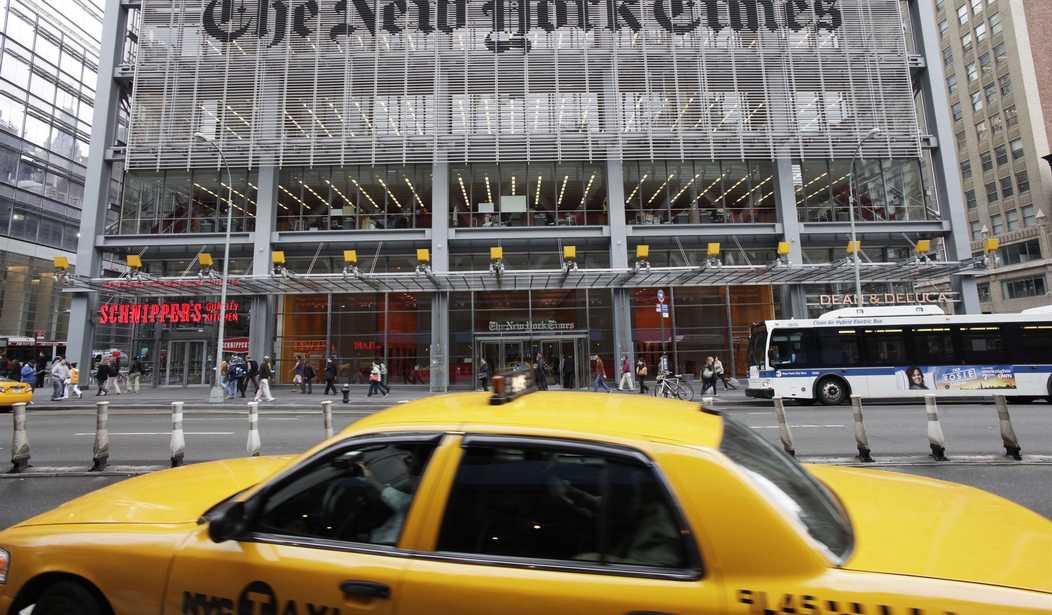On the first day of this new year, A.G. Sulzberger, new publisher of The New York Times, issued a public statement of purpose. He quoted approvingly the vision of the paper's founder, Adolph Ochs: "To give the news impartially, without fear or favor, regardless of party, sect, or interests involved." And he reiterated the importance of the press to the public at large: "Our founders understood that the free exchange of ideas and the ability to hold power to account were prerequisites for a successful democracy."
Sulzberger's take on the challenges facing the Times and other media is another example of the media's myopic lack of self-awareness. He writes:
"(A) dangerous confluence of forces is threatening the press's central role in helping people understand and engage with the world around them. ... Misinformation is rising and trust in the media is declining as technology platforms elevate clickbait, rumor and propaganda over real journalism, and politicians jockey for advantage by inflaming suspicion of the press. Growing polarization is jeopardizing even the foundational assumption of common truths, the stuff that binds a society together. Like our predecessors at The Times, my colleagues and I will not give in to these forces."
Cue the skeptical chortle here. Nowhere in Sulzberger's message is any express recognition of the press' own role in undermining public confidence in them. In Sulzberger's view, that's been caused by "politicians jockey(ing) for advantage."
By "politicians," I assume Sulzberger means -- primarily -- Donald Trump. But Trump did not inflame public suspicion of the press as much as he validated it. And Trump's willingness to call the media out has been the gift that keeps on giving. An increasingly "woke" public is now paying acute attention to instances of media bias and preference for narrative over news. And those instances are many. Consider just a few:
Recommended
--Rolling Stone magazine and reporter Sabrina Rubin Erdely lost a defamation suit brought by a dean at the University of Virginia, after Erdely wrote an article about rape at UVA that was riddled with errors and easily refutable falsehoods.
--Former CNN contributor Donna Brazile infamously gave Hillary Clinton's campaign presidential debate questions in advance.
--Former CNN producer John Bonifield was caught on tape referring to the Trump/Russia investigation as "mostly bull----" and a "witch hunt" to drive up ratings. (Fellow CNN contributor Van Jones was also caught referring to the entire investigation as a "nothingburger.")
The press' tendency to let their political views get in the way of doing their jobs has been ratcheted up several notches when it comes to Trump, as some journalists have noted with concern. In a scathing piece written for The Intercept last month, Glenn Greenwald excoriated the entire U.S. media for what he called "the most humiliating debacle in ages." CNN (followed by most other major media installations) had published yet another Trump/Russia/collusion "bombshell" -- this one about emails allegedly sent to Donald Trump Jr. -- that turned out to be utterly false (and easily debunked). Greenwald observed:
"(T)his type of recklessness and falsity is now a clear and highly disturbing trend -- one could say a constant -- when it comes to reporting on Trump, Russia and WikiLeaks. I have spent a good part of the last year documenting the extraordinarily numerous, consequential and reckless stories that have been published -- and then corrected, rescinded and retracted -- by major media outlets when it comes to this story."
Journalists who do take stories wherever the facts lead them quickly find themselves marginalized. Emmy Award-winning correspondent Sharyl Attkisson left CBS in 2014, frustrated with the network's efforts to thwart Attkisson's reporting into the 2012 Benghazi attacks and the Obamacare fiasco. More recently, Politico's Josh Meyer wrote a shocking expose of the Obama administration's deliberate derailing of an investigation into Hezbollah's drug and weapons trafficking and international money-laundering schemes. That investigation apparently conflicted with President Obama's desire for a nuclear deal with Iran, Hezbollah's patron. Meyer was immediately targeted as a traitor to the progressive cause, in what one publication described as an "echo chamber beat-down." (Relatedly, former Deputy National Security Advisor Ben Rhodes bragged at the time about how he misled the press by feeding them a false narrative about Obama's deal with Iran.)
Standing in stark contrast to Sulzberger's rah-rah anthem to media integrity is National Review contributing editor Andrew McCarthy's lengthy piece published the same day. McCarthy slowly and painstakingly picks apart the New York Times' contortions to pin a collusion charge on President Trump, changing the story and "moving the goal posts" each time facts emerge that refute their prior stories.
It is the press' job to hold powerful people in check. But the press have themselves acquired great power, and there is no one to hold them in check.
Toward the end of his note, Sulzberger says, "We will continue to put the fairness and accuracy of everything we publish above all else -- and in the inevitable moments we fall short, we will continue to own up to our mistakes, and we'll strive to do better."
He -- like much of the rest of the media -- has his work cut out for him.

























Join the conversation as a VIP Member